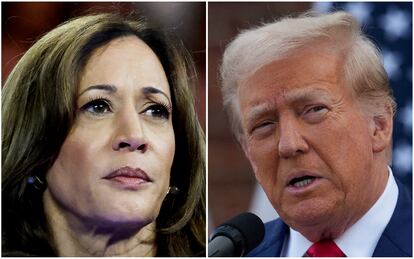Kamala Harris agrees to Trump debate rules, including muted microphones
The debate will be staged without a studio audience, candidates will not be able to consult notes, and only the person who has the right to speak will have their microphone on


Luck has favored Donald Trump in the first round of the debates that will pit the former president against the Democratic candidate, Kamala Harris, on September 10. In a toss-up, the Trump campaign has emerged the winner, allowing the Republican to choose between closing the debate or selecting his position on the stage. Trump will have the final word, as he did against Joe Biden on June 27. Harris, for her part, has chosen the lectern on the right, from the point of view of television viewers, the same one chosen by Biden. Otherwise, the candidates have accepted the same rules as in the duel between the current and former presidents, including turning off the microphone of the participant who does not have the right to speak.
That measure has restricted recent presidential campaign debates, which have become a succession of monologues with hardly any direct exchanges. The Biden campaign demanded the same stipulation for the CNN debate in June, after the confrontations during the 2020 campaign in which Trump did not stop interrupting. The way in which Biden cut Trump off in the first of those debates — “Will you shut up, man?” — handed the president several points as he emerged as the winner. Harris also resorted to a cutting phrase — “I’m speaking” — in response to Mike Pence’s interruptions during the 2020 vice-presidential candidate debate.
Although the measure was imposed by the Biden campaign it ended up benefiting Trump, who appeared more moderate and restrained. On the other side of the coin, the absence of interruptions did not prevent Biden from sinking alone in a wave of lapses and hesitations that set off alarm bells in the Democratic Party and hastened his withdrawal from the presidential race.
In anticipation of the new debate, the Harris campaign insisted that microphones be on for the entirety, but the Republicans’ refusal (despite Trump saying he preferred it) has led to the rules of the debate between Trump and Biden being repeated, which were those agreed upon before the Democratic nomination changeover. Although Harris’ campaign disagrees, it has ended up accepting the situation. “We understand that Donald Trump is a risk to skip the debate altogether, as he has threatened to do previously, if we do not accede to his preferred format,” says a Democratic campaign message cited by AP. In order not to “jeopardize the debate,” it adds, Harris’ team accepted “the full set of rules proposed by ABC, including muted microphones.”
Next week’s debate is being organized by ABC News. It will be staged in Philadelphia, at the National Constitution Center and will be broadcast at 9 p.m. Eastern Time. David Muir, presenter of ABC World News Tonight, and Linsey Davis, presenter of ABC News Live Prime, will moderate. On Wednesday, the network announced the rules that will govern the debate, the first between the two and, as yet, the only one agreed upon. Candidates will remain standing behind podiums throughout the debate and no props or pre-written notes will be allowed on stage. Each candidate will be provided with a pen, a pad of paper, and a bottle of water.
The debate, which will not be broadcast in front a live audience, will last 90 minutes with two commercial breaks during which campaign advisers and staff will not be able to interact with the candidates. There will be no opening statements, but instead questions from the moderators will be answered directly. Each candidate will have two minutes to respond to each question, with a two-minute reply and a one-minute counter-reply. Closing speeches will be two minutes long per candidate. Thanks to the coin toss, Trump will have the last word.
Sign up for our weekly newsletter to get more English-language news coverage from EL PAÍS USA Edition
Tu suscripción se está usando en otro dispositivo
¿Quieres añadir otro usuario a tu suscripción?
Si continúas leyendo en este dispositivo, no se podrá leer en el otro.
FlechaTu suscripción se está usando en otro dispositivo y solo puedes acceder a EL PAÍS desde un dispositivo a la vez.
Si quieres compartir tu cuenta, cambia tu suscripción a la modalidad Premium, así podrás añadir otro usuario. Cada uno accederá con su propia cuenta de email, lo que os permitirá personalizar vuestra experiencia en EL PAÍS.
¿Tienes una suscripción de empresa? Accede aquí para contratar más cuentas.
En el caso de no saber quién está usando tu cuenta, te recomendamos cambiar tu contraseña aquí.
Si decides continuar compartiendo tu cuenta, este mensaje se mostrará en tu dispositivo y en el de la otra persona que está usando tu cuenta de forma indefinida, afectando a tu experiencia de lectura. Puedes consultar aquí los términos y condiciones de la suscripción digital.








































